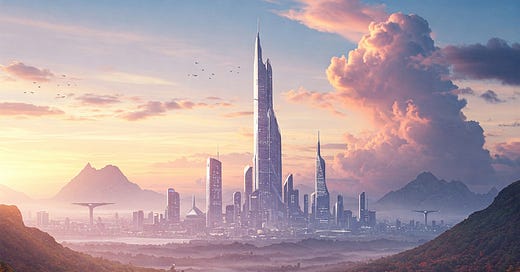Risk & Progress| A hub for essays that explore risk, human progress, and your potential. My mission is to educate, inspire, and invest in concepts that promote a better future. Subscriptions are free, paid subscribers gain access to the full archive, including the Pathways of Progress and Realize essay series.
In our study of human advancement, we examined progress from the most fundamental of physical laws, beginning with the physics written at the outset of the Big Bang, to the emergence of life on Earth, subsequent biological evolution, and then cultural evolution. Each step in the process saw a more rapid accumulation of “knowledge,” accelerating energy dispersion under the Second Law of Thermodynamics. Human progress is a continuation of this natural process. We use knowledge to capture energy and shape the world.
As the dominant species on Earth, we must be responsible stewards of all life. This also includes maximizing the odds of survival and flourishing for future generations. Ultimately, this creates a moral duty to expand and progress. It also thrusts upon us a profound realization: the future is mostly what we make of it. If we continue to understand and respect the fundamentals of progress, that future could be bright. If not, if we give in to our base instincts and fall for familiar fallacies, it will be very dark indeed. Our fate is what we choose it to be, nothing more, nothing less. I choose the light, and I hope you will, too.
Enter the 22nd Century
Of course, this raises the question…what would that bright future look like? Predicting times yet to come is normally a fool's errand. Futurists foresaw the flying car, but most didn’t see the smartphone. I cannot tell you precisely what that bright future will entail, but I can tell you what I hope that world will look like. Should we continue to advance and respect the fundamentals of human progress, I fully believe this future can become a reality. The essays in this series are, I hope, a rough guidebook to a prosperous 22nd Century; a guide to human flourishing.
Perhaps, by the close of the 21st Century, the education of our young will have been completely reimagined. AI “teachers” will have replaced or supplemented human instructors, adapting to individual students' learning styles and maximizing the passage of human knowledge from one generation to the next. Pupils will learn and absorb knowledge faster and more enjoyably. They will also emerge from the education system better prepared for the real world, all at a lower cost to the taxpayer than ever before.
The surplus funds that would have gone toward education could be directed toward the accelerated exploration and discovery of new ideas, perhaps through a combination of government grants and cash prizes for technological breakthroughs. Following the prescriptions laid out in this series, we should expect faster innovation and the accelerated discovery of new ideas and concepts. This will be especially true with the utilization and proliferation of AI technology, which will presumably aid researchers as they sift through the mountainous reams of data created over decades that came before them.
I hope that by the year 2100, the average life expectancy of the typical human will exceed 100 years. This could be achieved, in part, by improved diets, perhaps by using the tax code to discourage negative internalities and externalities, particularly regarding the consumption of sugar and other sweeteners at the center of many chronic illnesses. Additionally, we could leverage the advent of life extension drugs that slow the process of aging. Many of us could expect to live to 120 years of age, which some believe to be about the lifespan ceiling of the human physical body. From there, who knows, perhaps we could engage in mind-uploading, storing our knowledge, our consciousness, and our wisdom in the “cloud,” literally a purpose-built heaven on Earth.
Yet, our physical bodies needn’t be confined to Earth either. Should we play our cards right, the 21st Century will be a new age of exploration; the century when humans finally escaped the cradle. In the 20th century, we only dipped our toes into the final frontier, and even then, we could only do so through the extreme coercive force of government funding. This century could be different. We may witness human civilization extend beyond low Earth orbit, with perhaps, at least, a permanent human presence on the Moon and Mars, maybe even a self-sustaining colony. This will be enabled by reusable rocketry and, possibly, space slings and nuclear thermal engines.
Back on Earth, continued technological advancement and the dematerialization of our economies will have greatly reduced our environmental footprint. Our consumption of key commodities will have receded, and our emissions of harmful chemicals and waste products will also be massively reduced. As a consequence of technological progress, our material needs could be sustained using only a fraction of the Earth’s bounty. Perhaps this will enable us to become true conversationalists, allowing us to abandon half of the Earth’s surface to nature. I hope that our prosperous cities would gleam and glisten as islands of civilization on an Earth that is otherwise mostly a natural preserve.
This is not a prediction, but a hopeful vision. A vision of human prosperity, material abundance, and unparalleled capability. A future of progress, with millions of humans living and working beyond Earth, exploring and expanding deeper in the cosmos, living longer, happier, and healthier lives. Indeed, this vision may even undershoot reality; if technological advancements accelerate beyond that which we saw in the latter half of the 20th century, we can expect more possibilities, more potential, than I envision here. I trust that a future of hope, progress, and prosperity is one that we collectively aspire to realize, and we are brave enough to forge it into reality.
You may also like….







I love this kind of post. We need more positive visions for the future. It's important to understand the uplifting possibilities that we have in front of us as well as the negative expectations we are evolutionarily biased towards.
It's always interesting to consider what could be. It's also funny to see people, like our 'Morose little man' who are so nihilistic.